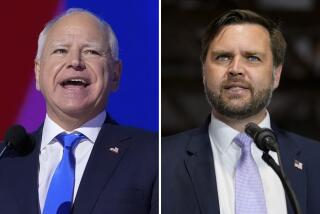GOP debate: Perry aims to bounce back, Gingrich hopes to bust out
- Share via
They say some fans watch stock car races for the crashes. And Saturday night, deep in heart of NASCAR country, the potential for some spinouts and pileups is heavy.
Just three days after a debate in Michigan, eight Republicans vying for their party’s presidential nomination will meet again, this time at Wofford College in Spartanburg, S.C.
The topic is foreign policy and national security, but the true matter at hand is whether Rick Perry can bounce back from his disastrous “brain freeze” Wednesday night, when the Texas governor was unable to name a third cabinet agency he would eliminate if elected.
On paper, it doesn’t look like all that much of a flub, but on the unforgiving television screen, Perry’s empty moment seemed to last an eternity as he thrashed about trying -- and failing -- to find the answer. Since then, the video of Perry’s travail has been replayed countless times and Perry has poked fun at himself on a battery of news and talk shows, including David Letterman’s “Late Show.”
But notoriety isn’t the same as viability—and Perry’s challenge Saturday evening will be to present himself as a composed, vital and articulate candidate, one with a stream of facts at his disposal and the nuances of policy at his command. In the other words, he needs a good night to calm his doubters.
But the debate’s focus won’t make that any easier. Foreign policy has not been Perry’s strong suit. His response at a debate in September, for example, when asked what he would do as president if Pakistan lost control over its nuclear arsenal was widely considered to be an incoherent mess.
In addition, Perry could face questions on immigration, an issue on which he is vulnerable with some conservatives. He has dismissed building a fence along the U.S.-Mexico border as impractical.
Perry isn’t the only contender who has struggled on foreign policy. Herman Cain has freely admitted that he’s still riding a learning curve, Michele Bachmann has been plagued by misstatements on the front, such as declaring Yemen as a state sponsor of terrorism, and Ron Paul’s isolationist views tend to marginalize him among his rivals more than any other issue.
The night very well could belong to Newt Gingrich, who is enjoying a surge in the polls and may be emerging as a top-tier threat to Cain and Mitt Romney. Indeed, the topic Saturday seems almost tailor-made for the former House speaker, who talks wirth an authority on foreign affairs that many of his competitors lack.
The candidates are likely to agree more than disagree on the hot-button issues of the moment. Expect plenty of criticism of the Obama administration’s approach to the Israeli-Palestinian conflict and its decision to pull all U.S. troops out of Iraq by the end of the year. And look for some serious saber-rattling about Iran and its potential nuclear weapons capability.
Of some interest will be the candidates’ approach to Libya. Some, such as Bachmann, were highly critical of the administration’s decision to intervene, while Gingrich seemed to progress through a series of positions but ended up critical of the U.S. taking a supporting role in the conflict. Romney’s views on the issue have also appeared to be at times inconsistent. Will the death of Moammar Kadafi prompt some revisionism?
South Carolina’s primary comes third on the schedule, after Iowa and New Hampshire, and appears, at the moment, to be shaping up into a battle between Cain and Gingrich with Romney in the mix as well. Gingrich, it seems, has the best shot Saturday of using the debate to add to the momentum he seems to be building.
The debate, which begins at 8 p.m. Eastern time and 5 p.m. Pacific, will be carried live on CBS. West Coast viewers will see the 90-minute affair in its entirety, while other viewers will only be able to see the first hour, with the rest being streamed online.
More to Read
Get the L.A. Times Politics newsletter
Deeply reported insights into legislation, politics and policy from Sacramento, Washington and beyond. In your inbox twice per week.
You may occasionally receive promotional content from the Los Angeles Times.










